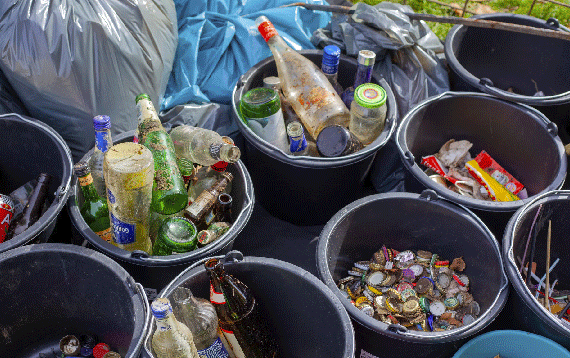The level of public awareness about the need to act against climate change — if we are to ensure the survival of human beings and the rest of the species on the planet — is greater than ever. The recent widespread emergence of the terms “climate crisis” and “climate emergency” are indications of this increased awareness. Concern for sustainability and more environmentally-friendly habits are gradually making their way into private homes.
Nevertheless, the numerous voices speaking out about the urgency of the situation are not alone: there are vocal elements who claim there is no problem at all and more moderate deniers who call into question the severity of the problem or the need to involve private citizens in the solution(s). Some of the more common arguments touted by climate change deniers are listed below along with science-based responses to each argument.
Climate change exists, and it is an urgent problem
“There are also studies that say that there is no human-caused climate change”
It is undeniable that a majority of climate change studies verify that the planet’s rising temperatures in recent decades are due to human influence, although the specific percentage of such studies is cause for debate. For years, the data point that has been repeated is that 97 percent of scientific studies that analyze climate change conclude that it is the result of human activity, leaving the scientific skeptics with only 3 percent of the studies. Official sources such as NASA cite this statistic.

Nevertheless, the numerous voices speaking out about the urgency of the situation are not alone: there are vocal elements who claim there is no problem at all and more moderate deniers who call into question the severity of the problem or the need to involve private citizens in the solution(s). Some of the more common arguments touted by climate change deniers are listed below along with science-based responses to each argument.
“Contamination doesn’t kill anyone”
According to data from the World Health Organization, more than one million people die each year from urban air pollution. This is because “residents of cities where there are elevated levels of atmospheric pollution suffer from more heart disease, respiratory problems, and lung cancer than those who live in urban areas where the air is cleaner.” Furthermore, for people with asthma, pollution increases the risk of asthmatic episodes.
“There have always been periods of warmer and colder weather”
According to United Nations data,every decade since 1980 has been warmer than the previous decade. One of the phrases frequently repeated by climate change deniers is that climate change is a natural process, and so there is no reason to be concerned, even if recent years are warmer.
Although temperature data has only been officially recorded since 1850, estimates from previous years have been extrapolated from sediment, tree rings, and ice nuclei. The historical data indicates that while the temperature has fluctuated over the past 2000 years, the fluctuations have never been as drastic and common-place as those in recent decades.
For example, the cold period spanning the14th to the 19th centuries known as the “Little Ice Age” reached its lowest and most extreme temperatures in different centuries depending on the region. In contrast, the record high temperatures of recent years have been a common occurrence worldwide.
Individual responsibility
In addition to the previous arguments, there are other types of objections related to the need for individual cooperation in the fight against climate change. Meaning, there are individuals who do not deny that the climate crisis is a reality, rather it is their view that only governments and supranational institutions are equipped to address the issue; the general public cannot be called on to take on responsibilities. Commonly-voiced statements supporting this viewpoint, such as the following, can also be heard.
“Recycling is useless, because everything ends up together anyway”
The belief is widely held that household waste separation for recycling is unnecessary because ultimately it all ends up mixed together. But the reality is precisely the opposite: not only is separated waste not combined, but rather it is further separated into subtypes of waste in order to be sent to different processing facilities. Individuals at home merely act as the first point of filtering.

In the words of Spain’s non-profit environmental organization, Ecoembes, when the plastic and aluminum waste in the recycling container reaches the facilities, “far from combining the waste that arrives from the trucks carrying the contents of the recycling bins, it is further separated by type of material. For example, plastic containers are separated by PET (plastic beverage and yogurt containers, for example), PEAD (shampoo and conditioner bottles, for example), film (wrappers, snack bags, etc.), and mixed plastics; aluminum cans are separated from steel products, and tetra brik (plasticized beverage containers) are all separated. After being separated, each material is sent to the corresponding recycling center so that they can be handled appropriately and converted into new raw materials (or new containers), ready for reuse.”
“It’s a global problem, and what I do doesn’t affect the general well-being”
Individual responsibility in the fight against climate change began to be a subject of debate much before the climate crisis erupted into the news media’s agenda. In the face of the argument that each of us have a role to play, as early as 2003 some voices warned that focusing on individual activity could divert the crucially needed attention required to reach a collective environmental agreement, and this train of thought is still very much alive.
A recent article in the magazine of the environmental organization, the Sierra Club, provided some key points about this dilemma. On one hand, and although it is indisputable that individual actions are not enough to solve the problem, they can make worthwhile contributions. Ecoembes, for example, estimates that “in 2019, thanks to the recycling of 1,505,661 tons of plastic containers, cans, and papers, 1.67 million tons of CO2 emissions were prevented, equivalent to the total of two months of emissions from Spain’s coal-fired power plants.”
On the other hand, there is another fundamental reason why individual action should not be undervalued, and it has to do with the contagion effect that can occur in collective activities. The personal actions of citizens have an impact on political actions, and they reinforce each other. If the general public is sensitive to the climate crisis and undertakes individual actions, it is much more likely that the political environment will be more prone to reinforcing these initiatives at the collective level.
Comments on this publication